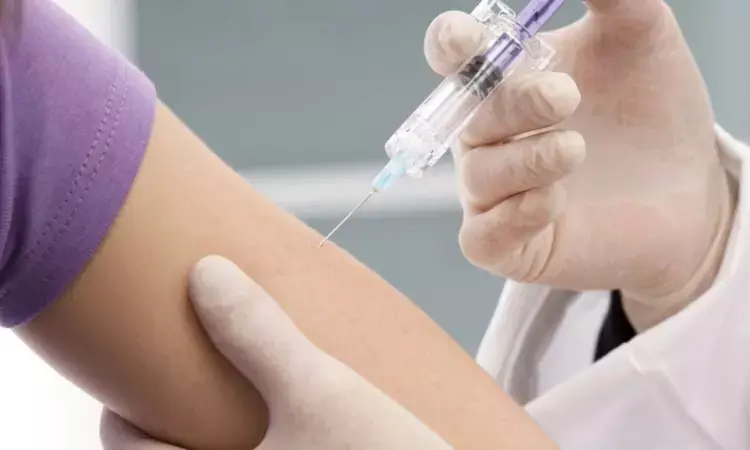- Home
- Medical news & Guidelines
- Anesthesiology
- Cardiology and CTVS
- Critical Care
- Dentistry
- Dermatology
- Diabetes and Endocrinology
- ENT
- Gastroenterology
- Medicine
- Nephrology
- Neurology
- Obstretics-Gynaecology
- Oncology
- Ophthalmology
- Orthopaedics
- Pediatrics-Neonatology
- Psychiatry
- Pulmonology
- Radiology
- Surgery
- Urology
- Laboratory Medicine
- Diet
- Nursing
- Paramedical
- Physiotherapy
- Health news
- Fact Check
- Bone Health Fact Check
- Brain Health Fact Check
- Cancer Related Fact Check
- Child Care Fact Check
- Dental and oral health fact check
- Diabetes and metabolic health fact check
- Diet and Nutrition Fact Check
- Eye and ENT Care Fact Check
- Fitness fact check
- Gut health fact check
- Heart health fact check
- Kidney health fact check
- Medical education fact check
- Men's health fact check
- Respiratory fact check
- Skin and hair care fact check
- Vaccine and Immunization fact check
- Women's health fact check
- AYUSH
- State News
- Andaman and Nicobar Islands
- Andhra Pradesh
- Arunachal Pradesh
- Assam
- Bihar
- Chandigarh
- Chattisgarh
- Dadra and Nagar Haveli
- Daman and Diu
- Delhi
- Goa
- Gujarat
- Haryana
- Himachal Pradesh
- Jammu & Kashmir
- Jharkhand
- Karnataka
- Kerala
- Ladakh
- Lakshadweep
- Madhya Pradesh
- Maharashtra
- Manipur
- Meghalaya
- Mizoram
- Nagaland
- Odisha
- Puducherry
- Punjab
- Rajasthan
- Sikkim
- Tamil Nadu
- Telangana
- Tripura
- Uttar Pradesh
- Uttrakhand
- West Bengal
- Medical Education
- Industry
Maternal vaccine promising for prevention of Group B Streptococcus infection in infants: NEJM

USA: A recent study published in The New England Journal of Medicine has revealed the potential of a maternally administered vaccine for infant group B Streptococcus.
The groundbreaking phase II randomized placebo-controlled study conducted in South Africa showed that pregnant women who received the hexavalent capsular polysaccharide (CPS)-cross-reactive material glycoconjugate vaccine (GBS6) produced antibodies against GBS that were transferred to their infants, offering protection against invasive GBS disease.
Led by Dr. Annaliesa Anderson and colleagues from Pfizer's Vaccine Research and Development in Pearl River, New York, the study enrolled 360 healthy pregnant women between the ages of 18 and 40. These women were randomized into different dose groups (5 μg, 10 μg, or 20 μg per serotype of GBS6) with or without aluminium phosphate or placebo.
● Results showed that antibody responses to all GBS serotypes were induced in pregnant women who received GBS6, with maternal-to-infant antibody ratios ranging from 0.4 to 1.3, associated with reduced risk of invasive GBS disease.
● The researchers also conducted a parallel sero-epidemiologic study within the same population to determine the IgG thresholds required for a 75% to 95% reduction in the risk of GBS disease.
● They found that IgG concentrations of 0.184 to 0.827 μg/mL were needed to achieve this level of protection.
The study found no safety concerns for mothers or their infants. The vaccine's potential to prevent both early- and late-onset GBS disease could be especially significant, as it might reduce the need for intrapartum antibiotic prophylaxis in otherwise healthy women. Intrapartum antibiotic prophylaxis, while effective in preventing early-onset GBS disease in infants during the first six days after birth, has limitations and may contribute to antimicrobial resistance and disruption of infant microbiome development.
Dr. Carol Baker, from the McGovern Medical School at the University of Texas Health Science Center in Houston, commented on the commercial apathy that has slowed the development of maternal vaccines in the past. However, the success of other maternal vaccines during pandemics, such as the H1N1 influenza pandemic and the COVID-19 pandemic, has led to a shift in perception. Maternal vaccines are now moving towards widespread acceptance by women and healthcare providers.
While the results are promising, the study focused on a South African population with a high disease burden among infants. Nevertheless, the findings may pave the way for an accelerated pathway to GBS vaccine licensure based on established serologic correlates of protection, followed by confirmation of effectiveness.
Overall, this maternal vaccine offers hope for an effective and safe measure to protect infants from GBS infection worldwide. Further research and validation will be crucial to determine its potential impact on maternal and infant health in diverse populations.
Reference:
New England Journal of Medicine Madhi SA, et al "Potential for maternally administered vaccine for infant group B streptococcus" N Engl J Med 2023; DOI: 10.1056/NEJMoa2116045.
Dr Kamal Kant Kohli-MBBS, DTCD- a chest specialist with more than 30 years of practice and a flair for writing clinical articles, Dr Kamal Kant Kohli joined Medical Dialogues as a Chief Editor of Medical News. Besides writing articles, as an editor, he proofreads and verifies all the medical content published on Medical Dialogues including those coming from journals, studies,medical conferences,guidelines etc. Email: drkohli@medicaldialogues.in. Contact no. 011-43720751


